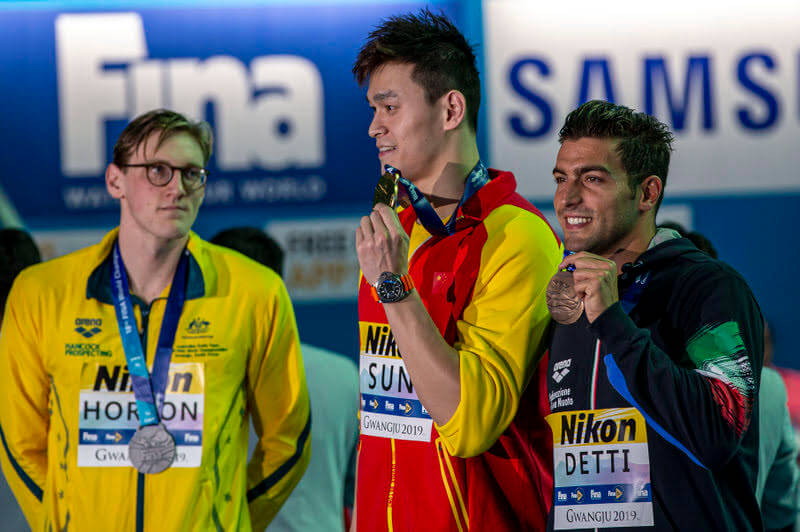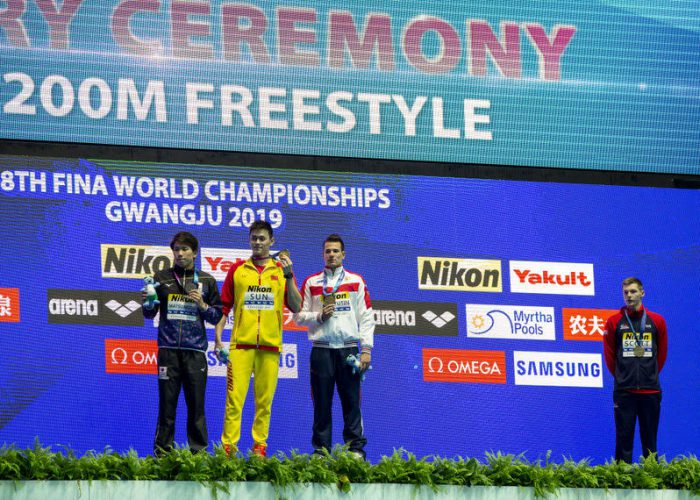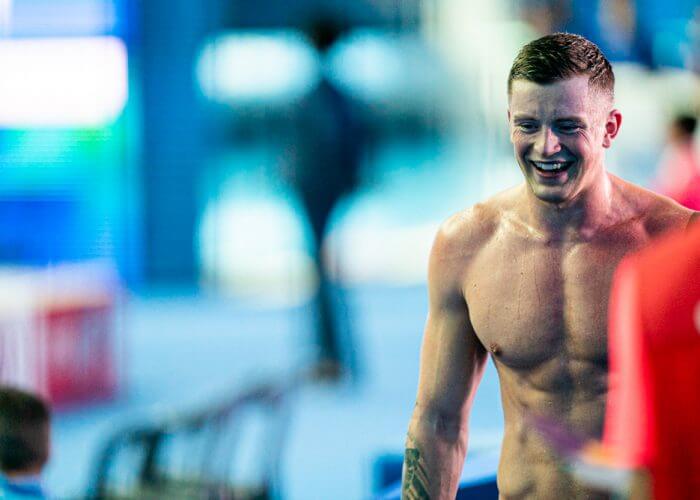USADA Boss Backs Horton & Scott: Failure To Resolve Sun Case Before Worlds “Shames” System

Travis Tygart Backs Mack Horton and Duncan Scott
Travis Tygart, the head of the United States Anti-Doping Agency (USADA), has weighed into the dispute between leading swimmers and FINA over its handling of the latest controversy involving China’s Sun Yang.
“Shame on the system… and we’re part of the system,” Tygart, a leading anti-doping figure and the man credited with bringing Lance Armstrong to justice, says. He was responding to questions over silent podium protests staged by Australian Olympic champion Mack Horton and Scottish Commonwealth champion, Duncan Scott, of Britain, during the World Championships in Gwangju last month.
Tygart suggested that a case against Sun over an acrimonious visit from out-of-competition testers last year should not have simply been down to a FINA Doping Panel to decide. Had it been referred to the Court of Arbitration for Sport from the start, protests of Gwangju could have been avoided, according to the American.
On the eve of defeating Sun for the Olympic 400m crown at Rio 2016, Horton criticised the Chinese swimmer, his doctor, FINA and others over Sun’s positive test and events surrounding it in 2014. Three years on, Horton cited a new Sun controversy and refused to stand on the podium with his rival in Korea last month after finishing second to the Chinese controversy in the 400m freestyle.
Athletes gave Horton a standing ovation as he arrived at the Athlete’s Village canteen following his protest, while the Australian coaching community issued a statement in support of the swimmer’s decision to take up his right of freedom of expression under the Olympic Charter.

Stand-off: Britain’s Duncan Scott, right, refuses to pose with Sun Yang, flanked by Katsuhiro Matsumoto, left, and Martin Malyutin, after the 200m free medals ceremony – Photo Courtesy: Patrick B. Kraemer
Scott followed Horton with his own podium protest after Sun finished second in the 200m freestyle but was promoted to gold when Lithuania’s Danys Rapsys was disqualified for moving on his blocks at the start of the race. Sun screamed at Scott on the podium before receiving his gold medal. Scott then refused to stand on the podium and pose for photographs with the other medallists in protest over Sun’s presence at the championships.
FINA, which had issued Horton with a warning after his day-1 protest, then issued Scott and Sun with warnings while also rushing through an emergency change to the Code of Conduct in an effort to prevent further protests.
The Acrimonious Testing Visit That Sparked Protest
A FINA Doping Panel issued Sun with a string of serious rebukes for his “extremely foolish” behaviour when out-of-competition testers called at the swimmer’s home in Zhejiang Province last September.
A hearing was called after testers from IDTM reported that they had battled with the swimmer and his entourage for more than four hours between 11pm on September 4 until gone 3am the following morning. The swimmer, his mother and his twice WADA-Code penalised doctor, Ba Zhen, was well as a security guard were present.
Argument ensued over the identification presented by the man there to observe the swimmer give a urine sample. Dr Ba, who arrived half-way through the dispute and after Sun had agreed to give blood, objected to the qualifications of the blood nurse. The testing visit ended with no urine sample given and a vial of Sun’s blood being smashed with a hammer by the security guard under instruction from Sun’s mother and with Sun, testers told the FINA Panel, shining his smart-phone torch on the scene.
The FINA Doping Panel let Sun off with a warning, however. After the Sunday Times in London revealed the details of the FINA Panel’s hearing report back in January, the World Anti-Doping Authority (WADA) decided to challenge the ruling by referring the matter to the Court of Arbitration for Sport (CAS).
None of the parties to the case requested an expedited process at CAS designed to have a decision made in time for the World Championships. Sun was free to race but did so to the sound of protest from swimmers, coaches and teams around the world.
On the eve of racing in Gwangju, the Australian Sunday Telegraph published the FINA Doping Panel’s report in full, in English and Mandarin.
A September date has been pencilled in for a hearing but that date has not yet been confirmed by CAS, which awaits word from at least one of the parties to the case.
Now, Tygart, in an interview with reporter Phil Lutton at the Sydney Morning Herald, says:
“It’s a part that we don’t have control over but it does reflect on all of us trying to fight for clean sport. Shame on us for putting athletes in a position where they had to protest and not join the podium. That’s not their fault… that’s our fault and we should take responsibility for putting them in that position. Good on them for standing up when the system has let them down.”
Athletes In No Mood To Back Down
On the way to the Tokyo 2020 Olympic Games athletes have pledged to press on with the formation of an athletes’ representative body that will insist on being heard by organisations such as the International Olympic Committee and FINA.

Adam Peaty – Photo Courtesy: Becca Wyant
In Gwangju, Britain’s Adam Peaty pointed to the case of Gabriel Santos, a Brazilian sprinter who tested positive for a steroid earlier this year: he was suspended and sent home from Korea and was unable to race at the championships pending an appeal. The Brazilian was also instantly removed from the new professional circuit run by the International Swimming League.
“That’s how it should be,” said Peaty. “That’s the hard line we have. There shouldn’t even be a question of breaking vials or anything like it. He [Sun Yang] should have been out straight away.”A union-style athletes’ body was being formed for the future fight, Peaty noted.
“That is coming in next few months if not next year because we’re in the process of setting it up. We’re going to take our time with it and get it right and then we can start to put our checkmate on the board.”
Against that backdrop, Tygart’s did not hide his criticism of a FINA conclusion to events in Gwangju that saw director Cornel Marculescu regret that Horton and Scott brought their sport “into disrepute, while failing to mention Sun or the case pending against him. Tygart said:
“Where the World Championships was really unfortunate was the Sun Yang case appeal had not been complete. Everyone would have been totally satisfied if the process had been complete and it wasn’t just a FINA internal panel that made the decision and it had gone to CAS.”
He added: “That’s the part where the frustration comes in and it’s a shame that the system didn’t work better to take the frustration away from all the athletes competing. You can understand why all the athletes would be frustrated having to compete with someone that has a pending case hanging over them.
“They certainly should have moved to have that case resolved. And I’m not judging the case, it’s on appeal and we will see how that plays out, but process-wise there was nothing that prevented that case being heard before the World Championships.:
Tygart Says There Was Time To Have Sun Set On Controversial Case
Critics of that view, such as former ASADA boss Richard Ings in Australia, have taken to social media to note that the Doping Panel case was “the case” and was resolved. An appeal or referral to CAS does not, Ings suggested, constitute a “pending case” and was a process that could be expected to take a longer period of time than six, let alone three, months.
Tygart begs to differ:
“If you look at the timing, the original violation was in early September, the hearing for the first case was in November, the decision came out in early January. The appeal had to happen within 30 days… there was plenty of time to have that completed before the World Championships and you avoid that conflict.”
Meanwhile, athletes are aware that the kind of silent protests seen in Gwangju could lead to medals being stripped away should such action be taken at an Olympic Games. Athletes are not, however, in a mood to heed threats. As Peaty put it when it was suggested to him that athletes protesting against injustice in the system faced the prospect of losing prizes: “I’d like to see them try.”
He said that the dispute with FINA over the ISL had shown athletes that the threats of organisations such as FINA held no power over them anymore. Athletes had learned to “stand together and refuse to accept what’s not acceptable”.




Chris Ball